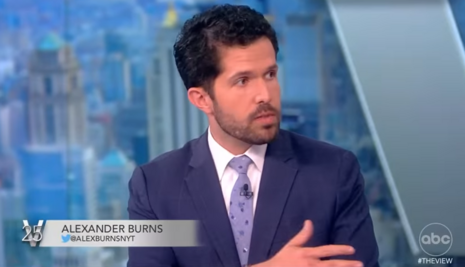 On the front page of Tuesday’s New York Times, national political reporter Alexander Burns warned that newly triggered abortion restrictions (i.e., "the rollback of women's rights") threatened to push young talent out of conservative red states, in the aftermath of the Supreme Court’s overturn of Roe v. Wade, as those smart, talented pro-choicers head for abortion-welcoming climates: “States With Abortion Bans Risk Losing Their Economic Edge.”
On the front page of Tuesday’s New York Times, national political reporter Alexander Burns warned that newly triggered abortion restrictions (i.e., "the rollback of women's rights") threatened to push young talent out of conservative red states, in the aftermath of the Supreme Court’s overturn of Roe v. Wade, as those smart, talented pro-choicers head for abortion-welcoming climates: “States With Abortion Bans Risk Losing Their Economic Edge.”
Meanwhile, the paper ignores the population drain from blue states like California, whose overbearing COVID restrictions on the economy have caused people to flee to freer states like Florida.
As a group of conservative states enacted severe abortion restrictions last year, Gov. J.B. Pritzker of Illinois sent letters to a handful of corporate executives with close ties to Texas.
Mr. Pritzker, a Democrat, urged executives to rethink basing their companies in “a state that strips its residents of their dignity.” Most workers, he wrote, did not want to live under a rigid abortion ban.
Oddly, European nations have suffered from such “severe” and “rigid” restrictions for years, without much notice from the Times, or any competition among EU to loosen abortion rules to attract young talent. As usual, liberals don't see unborn children as deserving of "dignity."
There was no immediate response to his overture. Companies thriving in Texas’ freewheeling business environment were not about to flee because of legally contested abortion regulations that were not certain to be enforced.
Ten months later, the political and legal landscape is radically different. And a Supreme Court decision that abolished the right to an abortion is now threatening to reshape the lines of economic competition between conservative and liberal states.
It’s far too early to document that “threat,” but Burns was eagerly expecting the worst.
Burns characterized the pro-life position in hostile fashion.
For companies anchored in economically vibrant conservative states like Texas, Tennessee and Georgia, the rollback of women’s rights is no longer a hypothetical scenario but an immediate challenge….
That bargain may have grown more difficult in states that have imposed punitive abortion restrictions, banning the procedure altogether or limiting it nearly to the point of elimination.
Then he brought in Biden's Secretary of Commerce for reinforcement:
Big companies are fighting a “war for talent,” [Gina] Raimondo said, and particularly for female talent given that women make up a growing majority of new college graduates. A former governor of Rhode Island, Ms. Raimondo predicted that companies would find it difficult to recruit skilled workers in states where women’s rights and medical services were sharply curtailed.
Burns found some unrelated “data” that allegedly backed up that view.
There is data to back up that view: A survey published this month by the Pew Research Center found that more than 3 in 5 people with college and postgraduate degrees disapproved of the Supreme Court’s decision, along with nearly 70 percent of people under 30. Sixty-two percent of women disapproved of the decision, according to the survey.
Even Burns admitted the recent culture wars haven’t hurt red state economies. "Yet even amid that drumbeat of controversy, a handful of big, conservative-leaning states like Texas, Florida and Georgia have defied predictions that anti-gay policies or laissez-faire gun laws would deter new investment."




